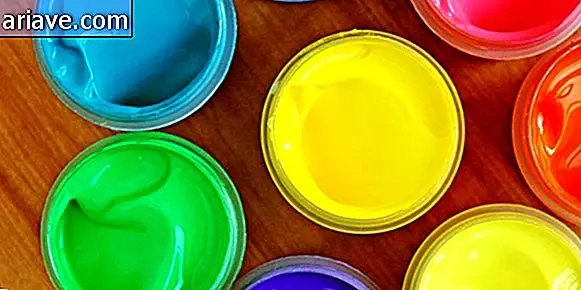4 scientific tips for those who want to be happier
Human beings are different in essence - and it's always good to make a difference. There are those who do well doing calculations, some who do not imagine doing anything other than music. When it comes to affinity, each person follows a different course, but when we think of a larger goal, we all seem to want the same thing: happiness.
Time magazine has published a series of rituals that can make us happy. And we are not talking about too subjective or abstract hints - in fact, these rituals were chosen based on research in the area of neuroscience, which studies our nervous system and, consequently, the human brain. In the article, written by Eric Barker, we have advice from University of California researcher and neuroscientist Alex Korb. It's worth checking out what this guy has to say:
1 - What is the best question to ask when you are feeling down?
Strange as it may be, the truth is that sometimes we feel guilty or ashamed that we are happy. Has it ever happened to you? If so, you can breathe a sigh of relief: guilt and shame are feelings that activate our reward brain region, which is the same as when someone takes drugs or eats chocolate.
“Despite their differences, pride, shame, and guilt activate similar neural circuits, including the dorsomedial prefrontal cortex, amygdala, insula, and the nucleus accumbens. Interestingly, pride is the most powerful of these emotions when it comes to provoking activity in these regions - except at the core accumbens, where guilt and shame win. This explains why it can be attractive to feed guilt and shame on ourselves - these emotions are activating the brain's reward center, ”explains the neuroscientist.
That is, the fact that we feel guilty or ashamed of some kind of happiness is actually a brain mechanism that makes us go in search of similar experiences - it is worth remembering that we are talking about the feeling of guilt and / or shame about to ordinary activities like having sex or dancing all night long in the best ballad ever.

Just as guilt and shame activate the same brain area that is "turned on" when chocolate or drugs are used, worry, which we also interpret as essentially bad, has the ability to make us feel better. According to Korb, when we are anxious, for example, our brains interpret that our concern about this is better than nothing.
Before you go out happily out of life for guilt, shame, and worry, know that these are harmful feelings in the long run. The tip is always to ask yourself the question, "What am I grateful for?" Gratitude, as everyone knows, is a fabulous feeling that, on top of that, makes your brain work better.
According to Korb, feeling gratitude affects our production of dopamine, a neurotransmitter related to movement, memory, and a sense of well-being. Many antidepressants work by causing the body to produce the same substance. And it doesn't stop there: gratitude also stimulates the production of serotonin, another magical substance that leaves us feeling good.

“Trying to think of things you are grateful for forces you to focus on the positive aspects of your life. This simple act increases the production of serotonin in the anterior cingulate cortex, ”says the neuroscientist. If your life is not going well, know that just the effort of trying to think of something that makes us want to thank you already works.
“One study found that this [showing gratitude] actually affects neuronal density in both the ventromedial cortex and the prefrontal lateral cortex. This change in density suggests that as emotional intelligence grows, neurons in these areas become more efficient, ”adds the neuroscientist - if you're interested in learning more about emotional intelligence, check out the Mega publications.

2 - Name these bad feelings
Suddenly you look terrible. Why? How about naming what is making you feel that way? It can be sadness, anger, jealousy, anxiety. The important thing here is always to name the oxen.
Korb cites a study in which participants saw images of people with emotional facial expressions. Predictably, the brain region activated when the volunteers saw the images was the amygdala, but when they had to recognize each emotion, the amygdala's reaction slowed and the ventrolateral prefrontal cortex was activated. Do you know what that means? Recognizing a negative emotion lessens the impact it has on you.

The same study noted that all the people who tried to hide what they were feeling completely failed. Even though these individuals were able to disguise these emotions from outside, imaging studies revealed that their brains had the same regions activated in the brains of other individuals.
What really works is describing the bad emotion that you feel with just one or two words that can help name this negativity. This simple exercise will make the feeling of sadness go away faster.
If neuroscientific appeal is not enough, know that meditation has taught you to name feelings for some good centuries. Naming feelings is a fundamental practice for those looking to have a good mental preparation.

3 - Decide!
You are in charge of deciding the location of a party. After you make your choice comes that sense of relief and peace of mind. Scientifically, making decisions is a proven way to reduce your levels of worry and anxiety, and of course help you solve your problems.
Korb explains that this has to do with the fact that making decisions implies setting intentions and goals. These tasks activate brain regions that do us good and leave us with a sense of positivity. What's more, making decisions decreases our chances of negative impulses. Finally, decisions made help us gain a better view of the world.

Sometimes it's not easy to make a decision, and everyone knows it. The tip here is to focus on decisions that are good enough for you. Avoiding being a perfectionist is always an interesting thing. According to Korb, not wanting everything to be perfect is something that leaves us with the feeling that we are in control of the situation, which is a great stress reducer. Not enough for you? So there you go: being in control of a situation is something that gives us pleasure.
The truth is that setting a goal and achieving it, which includes making decisions, makes a person feel happier than they would if something cool happened suddenly without their intervention.

4 - Good old human contact
We are needy and need the love and acceptance of others. Not having these two elements makes us sad. Tests involving brain monitoring have found that rejection - whatever it may be - activates the same brain regions that are in full swing when we are experiencing physical pain.
“One of the most primary ways to release oxytocin is through touch. Of course, it is not always appropriate to touch most people, but small touches such as handshakes and pats on the back are usually OK. With closer people, make the effort to touch them more often, ”recommends the neuroscientist.
It is also well known that this kind of approach through touch can make us more persuasive, better at teamwork, more gallant and, believe it or not, with greater ease in dealing with mathematical issues.
Passionate couples that go hand in hand are on the right track. Neuroscientifically, this gesture makes us comfortable even in dangerous situations. In a survey cited by Korb, women who thought they were going to be shocked were less afraid of pain when they held their husbands' hands.

Embracing is also extremely beneficial in relation to the proper functioning of your brain. "A hug, especially a long hug, releases the neurotransmitter and oxytocin hormone, which reduces activity in the tonsil"; As you may already know, it is the “love hormone” that makes us happy and calm.
There is research that offers us an interesting test: giving five long hugs a day, every day, for four weeks can greatly increase a person's happiness levels. And for a long time.
If you have no one to hug, you can come to Mega's office to solve this problem. The recommendation is to receive massage, which can increase serotonin production by up to 30%. Massage also lowers our stress hormones and increases dopamine levels, and of course is a great choice for those who want to sleep well.
The tip here is to have more interaction with other people and, of course, to give long hugs with those you are most intimate with. Then, if you decide to adopt these attitudes, tell us if it worked!
* Posted on 28/09/2015
***
Did you know that Curious Mega is also on Instagram? Click here to follow us and stay on top of exclusive curiosities!











